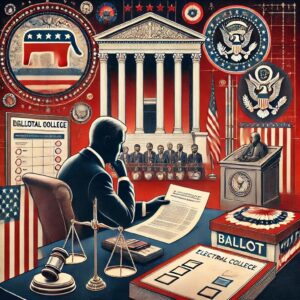In the United States, the electoral process is designed to reflect the voice of the people, ensuring that each vote matters in determining who will lead the country. But in an election as high-stakes as the presidential race, there can be instances where the losing candidate believes the result does not accurately reflect the votes. In these cases, candidates have legal avenues to challenge the outcome, ensuring fairness and transparency in the democratic process. This process is crucial not only for determining a clear winner but for reinforcing public trust in the election system.
Before a candidate can contest the outcome, there must be legitimate grounds for the challenge. Generally, these grounds include allegations of fraud, counting errors, voter suppression, or other irregularities that could have affected the result. Each claim must be substantiated with evidence, as baseless claims are not enough to launch a formal contest. State and federal courts require a clear reason to re-evaluate the results of a race as significant as the presidency, meaning the candidate must show that alleged errors or issues could have influenced the election’s outcome.
One of the primary ways to contest a presidential election is through a recount. Many states have rules for automatic recounts if the margin between candidates is exceptionally narrow, often less than 1% of the total votes. However, a candidate can request a recount if they believe errors occurred in the vote-counting process, even if the margin doesn’t automatically trigger one. Recounts involve re-tallying all votes, sometimes by hand, to ensure that each vote is counted accurately. Though time-consuming, recounts provide a transparent way to verify the results without drastic legal action.
If recounts don’t resolve the concerns, the next step involves filing lawsuits in state or federal courts. These lawsuits typically claim that voting irregularities, issues with ballot access, or procedural errors impacted the election outcome. For instance, a candidate may argue that specific ballots were improperly rejected or that certain voters faced barriers to casting their ballots. Once filed, these lawsuits are handled by judges who examine the evidence, hear testimonies, and ultimately determine whether the claims hold enough merit to affect the outcome. However, the legal burden of proof is high, requiring strong evidence to justify any change in results.
If challenges persist even after recounts and lawsuits, the U.S. Constitution provides an additional avenue through the Electoral College and Congress. After voters cast ballots, the Electoral College meets to formalize the election by voting on behalf of the states. Congress then meets to count these votes, and if there are objections to the certified results, members of Congress may challenge specific electoral votes. This process requires both a House representative and a Senate member to formally object to any state’s results, prompting debate and a vote on the issue. While it’s rare, this mechanism allows for additional scrutiny of the election.
In extraordinary cases, the contest may escalate to the U.S. Supreme Court. This level of intervention is highly uncommon but was famously seen in the 2000 Bush v. Gore election, where the Court ultimately decided on the recount process in Florida. For the Supreme Court to get involved, the case must present substantial constitutional questions or demonstrate that lower courts failed to address significant issues. If the Supreme Court rules on an election issue, its decision is binding, providing a definitive answer to the contest.
The process of contesting an election isn’t just about deciding who wins. It’s about ensuring the integrity of the system itself. When candidates have the option to challenge results legally, it reassures the public that elections are fair, accurate, and transparent. This right to contest is a fundamental part of American democracy, ensuring that the electoral process remains accountable and robust. Although challenging an election outcome is a lengthy and sometimes contentious process, it serves as a vital check within the democratic system, reinforcing the legitimacy of the final result.
Contesting a presidential election is a rare and often complex process, guided by legal standards and detailed procedures. Through recounts, lawsuits, and, in some cases, congressional or judicial intervention, the United States ensures that candidates have every opportunity to verify election outcomes. By navigating this careful legal process, the country demonstrates its commitment to a fair and transparent democracy, where the voice of the people is paramount.

